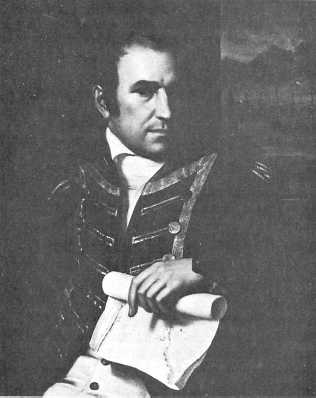| |
PREBLE AND “HIS BOYS”
Commodore Edward Preble (fig. 2-5) fought as a
lieutenant in the American Revolution and later in
the war with France. He believed in Truxtun’s ideas
and expanded them. Having served during the
Revolution, he also realized the need for justly
administered discipline. Like Truxtun, he was keenly
interested in his blue-jackets; their care and fair
treatment absorbed his attention. Preble also shared
responsibility with his officers and encouraged them
to offer new ideas. He was generous in giving his
subordinates credit for their achievements in the
squadron and in urging promotions and honors for
those who had earned them. The mutual regard
between the commodore and his young officers (all
the captains and lieutenants were under 30 years of
age) united the fleet in spirit.
Preble taught his subordinates the necessity for
absolute obedience, unyielding courage, and
134.8
Figure 2-5.-“Take care of your officers.”
Commodore Edward Preble commanded the
American squadron that smashed the might
of the Barbary pirates in the Mediterranean
during 1803-1804. The
training he gave his
young subordinates (who came to be
known as Preble’s boys) at that time paid
dividends in the War of 1812, when they
achieved 17 out of 18 naval victories.
24-hour-a-day efficiency, which have continued to be
standards of the U.S. Navy. Preble’s exemplary
leadership was proven in the War of 1812, when his
“boys” scored 17 of the 18 victories won by the
American navy in combat.
WAR OF 1812
SIGNIFICANT DATES
9 Mar. 1798
George Balfour appointed first
surgeon in U.S. Navy.
18 Mar. 1798 Benjamin Stoddert is appointed
first Secretary of the Navy.
The Navy was outnumbered 40 to 1 in the second
war with Great Britain and by 1814 had suffered
severe reverses. Our coast was tightly blockaded; our
ships were driven from the high seas; and our
nation’s capitol had been burned. Nevertheless, the
Navy won a series of frigate and sloop-of-war duels,
which gained it a world reputation. These victories
were the result of naval traditions set by some of our
greatest leaders. We had the best frigates in the
world—the tradition of Humphreys; we had the best
gunnery in the world—the tradition of Truxtun; our
morale was high—the tradition of Preble; and our
Navy had a great fighting spirit—the tradition of
John Paul Jones.
These brilliant frigate victories on the high seas
had little effect on the course of the war itself.
However, the naval leaders responsible for these
victories contributed much to the building of
traditions in our Navy.
ISAAC HULL
Before the turn of the century, Hull had already
made his mark in history by capturing a French
privateer. Although the French ship was larger and
more heavily armed than the ship he commanded,
Lieutenant Hull and his men captured the ship
without the loss of a single man.
Captain Hull’s greatest role in naval history was
as the commanding officer of the Constitution in the
battle against the Guerriere commanded by Captain
Dacres. During that battle, Hull quietly moved
among his officers and men, addressing them with
words of confidence and encouragement such as
“Men, now do your duty.” And every man stood firm
to his post.
2-8
|

